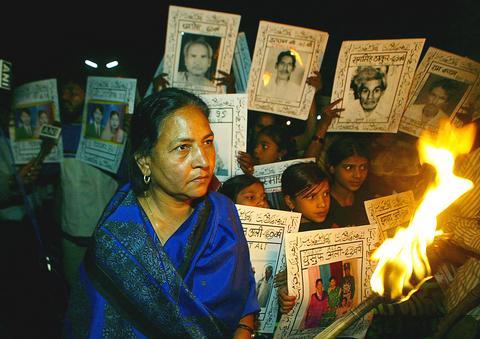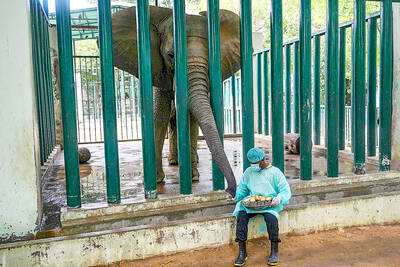Twenty years after a cloud of deadly gas savaged this central Indian city, thousands of demonstrators and survivors marked the anniversary of the world's worst industrial accident yesterday with protests demanding justice for those still suffering.
A leak of 40 tons of poisonous gas from a Union Carbide pesticide plant on Dec. 3, 1984, killed at least 10,000 people in Bhopal and affected more than 555,000 others, although the exact number of victims has never been clear. Many died over the years due to gas-related illnesses, like lung cancer, kidney failure and liver disease.

PHOTO: AP
While millions of dollars in compensation has been set aside, much of the money has been tied up by bureaucratic and legal issues and many people have received little or nothing.
``For the last 20 years I've been visiting the hospital and government offices, begging for compensation to take care of my two children,'' said Leelaben Aherwar, whose baby girl survived the gas leak but immediately afterward began showing signs of mental and physical retardation.
Her son, born a few years later, suffers from similar problems.
``The answer is always the same: 'The court will make a decision.' I don't know what court is this that cannot see our suffering,'' she said yesterday.
So far, she has received about 16,000 rupees (US$360).
US chemical company Union Carbide Corp., which was bought by Michigan-based Dow Chemical Co. in 2001, paid US$470 million in compensation under a settlement with India's government in 1989. But only part of that amount has reached the victims.
Rashida Bee, a disaster survivor who heads a women victims' group, said the protesters would conclude yesterday's rally with a mass pledge to keep up the fight until victims' demands for compensation, medical care and rehabilitation are met.
`They are treating us, the victims, like the culprits responsible for causing the disaster,'' Bee said.
The protesters also called on Dow Chemical to clean up the plant site, where rusted pipes and pesticide storage tanks have collapsed or ruptured in the years since the plant was abandoned after the disaster.
``Lethal chemicals are still lying around at the plant, some in the open. Every time it rains these poisonous chemicals are leaked into the soil, affecting groundwater resources of the area,'' Bee said.
Union Carbide insists the tragedy was due to sabotage by a disgruntled employee and not shoddy safety standards or faulty plant design, as claimed by many activists.
Union Carbide, in a statement sent to reporters, said it spent more than US$2 million to clean up the plant from 1985 to 1994, when it sold its stake in Union Carbide India Ltd. and the local company was renamed as Eveready Industries.
The company also says state studies indicated in 1998 that the groundwater around the plant was free of toxins and that any water contamination was due to improper drainage and other pollution, not Union Carbide chemicals.
The state government took over legal responsibility of the site in 1998, but it has done little to remove the debris and sacks of chemicals. Greenpeace estimates it would cost at least US$30 million to clean up the plant and the groundwater and soil that it claims are laced with carcinogens.
Dow maintains the legal case was resolved in 1989, when Union Carbide settled with the Indian government.
Union Carbide claims that 3,800 people were killed, while Indian officials say up to 15,000 may have died.
Indian officials estimate that nearly 600,000 more have become ill or had babies born with congenital defects over the last 20 years.

NO EXCUSES: Marcos said his administration was acting on voters’ demands, but an academic said the move was emotionally motivated after a poor midterm showing Philippine President Ferdinand Marcos Jr yesterday sought the resignation of all his Cabinet secretaries, in a move seen as an attempt to reset the political agenda and assert his authority over the second half of his single six-year term. The order came after the president’s allies failed to win a majority of Senate seats contested in the 12 polls on Monday last week, leaving Marcos facing a divided political and legislative landscape that could thwart his attempts to have an ally succeed him in 2028. “He’s talking to the people, trying to salvage whatever political capital he has left. I think it’s

Polish presidential candidates offered different visions of Poland and its relations with Ukraine in a televised debate ahead of next week’s run-off, which remains on a knife-edge. During a head-to-head debate lasting two hours, centrist Warsaw Mayor Rafal Trzaskowski, from Polish Prime Minister Donald Tusk’s governing pro-European coalition, faced the Eurosceptic historian Karol Nawrocki, backed by the right-wing populist Law and Justice party (PiS). The two candidates, who qualified for the second round after coming in the top two places in the first vote on Sunday last week, clashed over Poland’s relations with Ukraine, EU policy and the track records of their

UNSCHEDULED VISIT: ‘It’s a very bulky new neighbor, but it will soon go away,’ said Johan Helberg of the 135m container ship that run aground near his house A man in Norway awoke early on Thursday to discover a huge container ship had run aground a stone’s throw from his fjord-side house — and he had slept through the commotion. For an as-yet unknown reason, the 135m NCL Salten sailed up onto shore just meters from Johan Helberg’s house in a fjord near Trondheim in central Norway. Helberg only discovered the unexpected visitor when a panicked neighbor who had rung his doorbell repeatedly to no avail gave up and called him on the phone. “The doorbell rang at a time of day when I don’t like to open,” Helberg told television

A team of doctors and vets in Pakistan has developed a novel treatment for a pair of elephants with tuberculosis (TB) that involves feeding them at least 400 pills a day. The jumbo effort at the Karachi Safari Park involves administering the tablets — the same as those used to treat TB in humans — hidden inside food ranging from apples and bananas, to Pakistani sweets. The amount of medication is adjusted to account for the weight of the 4,000kg elephants. However, it has taken Madhubala and Malika several weeks to settle into the treatment after spitting out the first few doses they